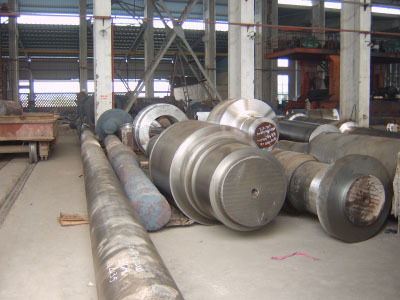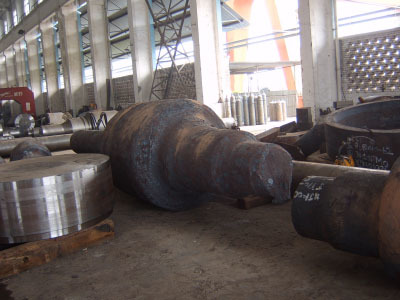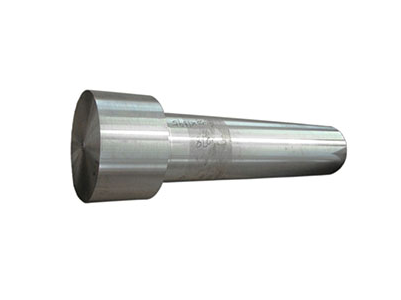Why Forged Roller Step Shafts Are Essential for Modern Shipbuilding Practices
Release Time:
Oct 26,2025
Understanding the Role of Forged Roller Step Shafts in Shipbuilding In the rapidly evolving maritime industry, **forged roller step shafts** emerge as critical components, significantly impacting the efficiency and durability of modern ships. These specialized shafts, designed to withstand immense stresses and harsh environments, are essential in various shipbuilding applications. We delve into

Understanding the Role of Forged Roller Step Shafts in Shipbuilding
In the rapidly evolving maritime industry, **forged roller step shafts** emerge as critical components, significantly impacting the efficiency and durability of modern ships. These specialized shafts, designed to withstand immense stresses and harsh environments, are essential in various shipbuilding applications. We delve into the intricacies of forged roller step shafts, examining their manufacturing processes, advantages, and relevance in contemporary shipbuilding practices.
Table of Contents
1. What are Forged Roller Step Shafts?
2. Importance of Forging in Shaft Manufacturing
3. Key Advantages of Forged Roller Step Shafts
3.1 Enhanced Strength and Durability
3.2 Improved Performance in Harsh Conditions
4. Manufacturing Process of Forged Roller Step Shafts
4.1 Material Selection
4.2 Forging Techniques
5. Applications of Forged Roller Step Shafts in Shipbuilding
5.1 Use in Propulsion Systems
5.2 Role in Marine Gear Systems
6. Comparison with Other Shaft Types
7. Future Trends in Shaft Manufacturing
8. Frequently Asked Questions (FAQs)
9. Conclusion
1. What are Forged Roller Step Shafts?
Forged roller step shafts are specialized components crafted through a forging process, characterized by their unique geometry and design. These shafts typically feature steps or grooves that allow for efficient integration with other mechanical parts, such as bearings and gears. Unlike traditional shafts that may be machined from solid bars, forged roller step shafts offer superior structural integrity due to their manufacturing process, which aligns the grain structure of the metal, resulting in enhanced mechanical properties.
2. Importance of Forging in Shaft Manufacturing
The forging process is fundamental to the creation of high-performance shafts. During forging, metal is heated and shaped under pressure, which alters its internal structure. This method significantly enhances the strength and toughness of the material, making forged components more resistant to wear and fatigue. In shipbuilding, where equipment is subject to extreme conditions, the benefits of forging become indispensable.
3. Key Advantages of Forged Roller Step Shafts
3.1 Enhanced Strength and Durability
One of the primary advantages of forged roller step shafts is their exceptional strength. The forging process results in a homogeneous material with superior tensile strength compared to cast or machined alternatives. This characteristic is vital for marine applications, where shafts must endure high torque and load stresses.
3.2 Improved Performance in Harsh Conditions
Marine environments present unique challenges, including corrosion, high humidity, and temperature fluctuations. Forged roller step shafts are often made from corrosion-resistant materials or treated to enhance their resistance to environmental factors. This durability ensures long-term performance and reliability, reducing maintenance costs and downtime.
4. Manufacturing Process of Forged Roller Step Shafts
The manufacturing of forged roller step shafts involves several critical steps that ensure their quality and performance.
4.1 Material Selection
Selecting the right material is crucial. High-strength alloys, such as carbon steel or stainless steel, are commonly used due to their excellent mechanical properties and corrosion resistance. The choice of material directly influences the shaft's performance and longevity.
4.2 Forging Techniques
Various forging techniques can be employed, including open-die forging, closed-die forging, and precision forging. Each method has its advantages depending on the required specifications and the production volume. Precision forging, for example, allows for tighter tolerances and reduced machining time, making it ideal for high-performance applications.
5. Applications of Forged Roller Step Shafts in Shipbuilding
Forged roller step shafts find extensive applications in shipbuilding, contributing to various systems that enhance vessel performance.
5.1 Use in Propulsion Systems
In propulsion systems, these shafts are integral to connecting engines with propellers. Their ability to transmit high torque efficiently is essential for optimizing fuel consumption and vessel speed, making them a vital component in modern ship design.
5.2 Role in Marine Gear Systems
Forged roller step shafts are also crucial in marine gear systems, where they help transmit power from the engine to different parts of the ship. Their design allows for seamless integration and efficient power transfer, enhancing the overall operational efficiency of the vessel.
6. Comparison with Other Shaft Types
When comparing forged roller step shafts to other types, such as cast or machined shafts, the advantages become clear. Forged shafts typically offer superior strength, weight savings, and better resistance to fatigue. While cast shafts may be less expensive, they often lack the same durability and performance characteristics required in demanding marine environments.
7. Future Trends in Shaft Manufacturing
As the shipbuilding industry continues to innovate, the demand for advanced materials and manufacturing techniques will grow. Trends such as the incorporation of **smart technologies** and **additive manufacturing** are emerging. These developments aim to improve the efficiency and performance of forged roller step shafts, ensuring they remain at the forefront of marine engineering.
8. Frequently Asked Questions (FAQs)
What is the primary advantage of using forged roller step shafts in shipbuilding?
The primary advantage is their enhanced strength and durability, which allows them to withstand high loads and harsh marine environments.
How do forged roller step shafts compare to cast shafts?
Forged roller step shafts offer better strength, fatigue resistance, and performance characteristics compared to cast shafts, making them more suitable for demanding applications.
What materials are commonly used for forging roller step shafts?
Common materials include high-strength carbon steel and stainless steel, selected for their excellent mechanical properties and corrosion resistance.
What manufacturing techniques are used for forging roller step shafts?
Techniques such as open-die forging, closed-die forging, and precision forging are typically employed, depending on the specifications and production needs.
What are the future trends in shaft manufacturing for shipbuilding?
Future trends include the adoption of smart technologies and additive manufacturing to enhance the efficiency and performance of forged roller step shafts.
9. Conclusion
Forged roller step shafts play an essential role in modern shipbuilding, combining strength, durability, and reliability. Their unique manufacturing process, coupled with advanced material properties, makes them indispensable in various applications, from propulsion systems to marine gear assemblies. As the maritime industry continues to evolve, the importance of these components will only grow, ensuring that they remain critical to the design and construction of efficient, high-performance vessels. Investing in forged roller step shafts is not just a choice; it is a commitment to quality and excellence in shipbuilding practices.
多行文本内容元素
富文本内容绑定数据后可解析HTML语言内容
Key words:
News Hotspot








